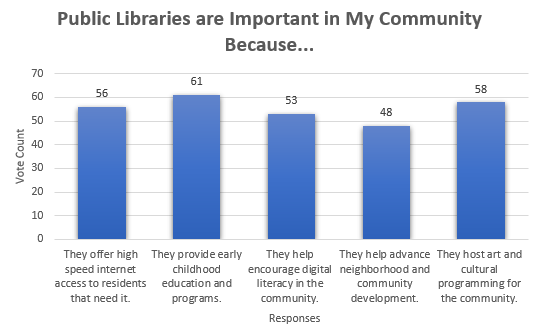
by Rebecca DeSantis, content and engagement coordinator, ICMA
Libraries have always served as a resource and gathering place for communities, but their role is evolving as community needs change. Jessica Cadiente, ICMA member and library director of the Santa Barbara Library in California for just over three years, is actively helping her library fit the needs of the residents in Santa Barbara. "Local libraries are flexible and nimble," she states. "We joke that we are always in draft form because as our communities change so do we."
When the Thomas fire hit the area in December 2017, the library sprang into action to help provide services for the community. Cadiente explains: "While everyone was trying to leave town and many other organizations, businesses, and community centers across town closed, our library team stayed. We knew it was an all hands on deck moment and everyone stepped up to extend services. We immediately added more programming, more classes, more events."
The Santa Barbara Public Library became a "breathe easy" location for residents, distributing N95 masks and providing a safe space with clean air. Not only could residents come to the library to learn about fire safety and recovery efforts, it also served as a place where the community could gather after the trauma and heal together. According to Cadiente, the library also provided 78 different youth programs during a 22-day span to engage children in activities while the schools were closed. Cadiente explains that this is just one way in which the library evolved to meet a community need.
In both immediate actions and long-term initiatives, libraries across the country are working with the community to provide resources and services that meet the needs of each generation of library users. In 2016, ICMA partnered with the Aspen Institute and the Public Libraries Association to conduct the nationwide survey “Local Libraries Advancing Community Goals,” which focused on the evolving role of public libraries in advancing community goals. In this month's "facts and stats" blog, we pull out some of the highlights from this survey and what this means for libraries today.
53% of jurisdictions cited foundations and nonprofit organizations as part of their strategy to ensure financial sustainability of the library system.
For libraries and other local service delivery mechanisms, ensuring financial stability means finding ways to fund the programming and services even when local funding changes. "As with any public library, funding and financial stability are often elusive," says Cadiente. She offers three recommendations for local library leaders:
- Earn the buy-in of elected officials and chief administrative officer by bringing them and other decisionmakers with you on the journey to advance the library's role and mission in the community.
- Teach your team how to tell the library's story and advocate for the library's needs.
- Cultivate relationships with key community stakeholders and support groups to advocate on your behalf if cuts are made.
73% of responding jurisdictions ranked “access to high-speed internet service” as an important or highly important role of their local library.
As internet use has become essential in many everyday tasks, the library serves as an access point to internet services for residents who need it. Many libraries also offer computer literacy programming to help people become more fluent in using the internet to search for jobs, request an absentee ballot, or navigate the community in other ways. "The 21st-century public library reflects a shift away from building collections to building connections and knowledge networks in the community," explains Cadiente. "Our community is at the center of our mission. We act as a facilitator of human connection and understanding."
60.1% of respondents rate the level of public interest in library services in the community as “high” or “very high.”
Whether visiting the library or library website for children's programming, internet access or searching for the next book to read, chief administrative officers report that residents continue to have a high level of interest in library services; however, there are challenges to keeping the community engaged while also helping libraries fulfill local government needs. Cadiente recommends that local governments try "looking to their public libraries as the public face of the social framework of their city and/or county. The public library is positioned to help any locality expand community engagement."
In thinking about the future of local libraries and local governments working together to achieve community goals, Cadiente believes it is an "open-ended opportunity." She offers a few ideas for ways the library can help local governments achieve their goals:
- Partner with the library to introduce young children to police officers during early literacy classes if your goal is to help officers be more approachable.
- Host a class at the library on a new technology if your goal is to introduce it in the community.
- Invite the library to discuss policy and procedures around homelessness if your goal is finding new solutions to assist this community. Libraries often house people experiencing homelessness during the day.
- Invest in your downtown library if your goal is to revitalize your downtown area. This is a natural people magnet, and if the library brings families who then spill out into restaurants and shops, this is a win for everyone.
Thanks for taking our poll. Check out what our readers think about public libraries:

New, Reduced Membership Dues
A new, reduced dues rate is available for CAOs/ACAOs, along with additional discounts for those in smaller communities, has been implemented. Learn more and be sure to join or renew today!
